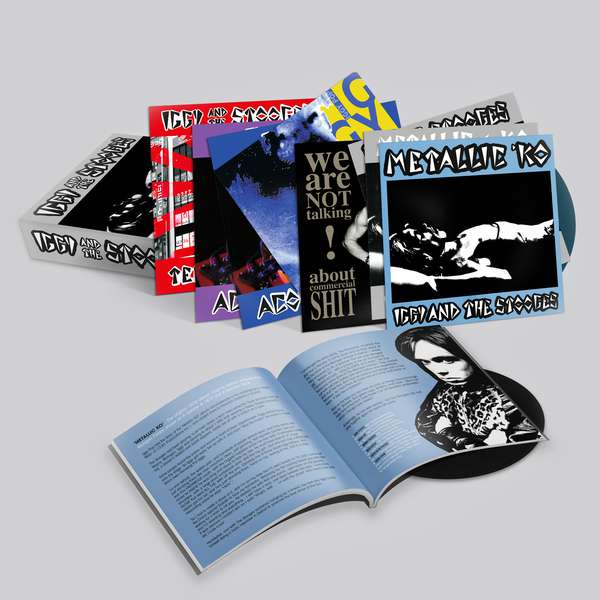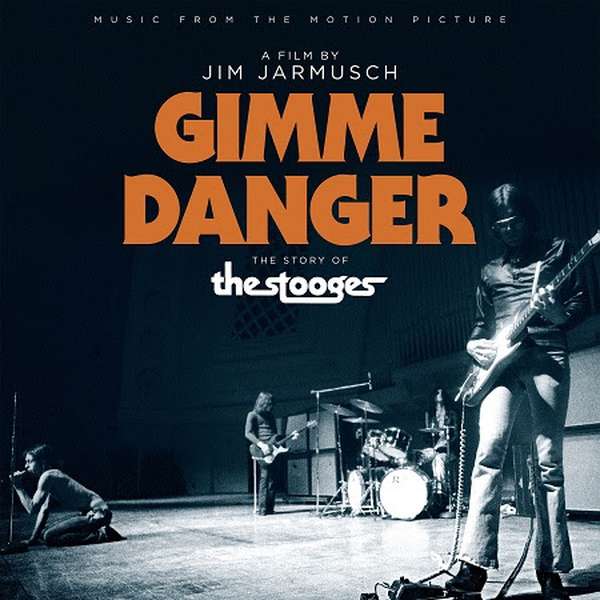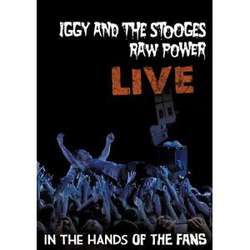"Raw Power’s got a son named rock n’ roll"
Leave it to Iggy Pop to both boast about this record and succinctly describe what an album’s impact would be on music. Seriously, look at the cover to the album, and I mean REALLY look at it; get it out of your collection and look at it, and if it is not in your collection, there is something seriously wrong with you. Now, realize that Raw Power originally was released in 1973 in the same year as Led Zeppelin's Houses of the Holy and Pink Floyd's Dark Side Of The Moon amongst a slew of other more commercially viable acts; think about those album covers while looking at Raw Power (do not play the album yet). Raw Power looks vicious and dangerous and unseemly next to those records, almost the kind of record that one’s parents would scream for kids to knock off the noise (or even threaten them with obscene punishments for playing such filth in their house); scary people should like this record (the kind that walk down the streets with switchblades in their pockets leering at passer’s by waiting to assault anyone that dared look at them). Raw Power is one of the birthing places of the original waves of punk rock; the album truly is a complete original, which no one has been able to match nor come even close to the sheer animalistic fury that the original eight tracks unleash on people’s ears.
Now, put the record on your turntable or CD player or computer or MP3 player (what have you), and listen to Raw Power again. Be floored once again by the opening riff of “Search & Destroy” (courtesy of James Williamson) and Iggy Pop’s misanthropic poetry,
"I’m a street walking cheetah with a heart full of napalm
I’m a runaway son of the nuclear a-bomb
I am the world’s forgotten boy
The one who searches and destroys"
Henry Rollins (formerly of Black Flag, International Indie Icon, etc) emphatically comments on these lyrics (in the DVD documentary included in the deluxe version of Raw Power) “You only wish you could write poetry like that; Will Shakespeare wishes he could write poetry like that!” Pop and Williamson literally deliver one for the ages (as evidenced by the numerous covers of this song by bands that wish they could be half as tough as the Stooges) by composing one of the more iconic rock and roll songs in existence (the #468th song of all time according to Rolling Stone and the 49th best rock song of all time according to VH-1). Forget about those accolades though, because as the song plays, anyone with half a brain can tell that this song cooks; you can feel it in your bones and in your gut.
As the slow, roiling atmosphere of “Gimme Danger” kicks in to gear, the rhythm section locks in like few others can, laying a brutish back bone for the snaking guitars and subtle menace of Pop’s words. The band conjures images and creates a mood not unlike walking down a dark alley by oneself full of fear, paranoia, and self-loathing while looking for a fix of some unmentionable indiscretion; the clanging piano certainly seals the deal in this aural portrayal of some seedy underbelly of a broken down metropolis full of unseemly temptations. Arresting in its delivery and the breathtaking beauty of the music will drag any listener headlong into the sense of doomed nihilism that oozes through this track and is the hook to pull you into the album’s cast of denizens and ne’re do wells with its sinewy melodic hook.
The cocked up, brazen attitude of Iggy and the Stooges ratchets even higher with the smarmy, arrogant swagger of “Your Pretty Face Is Going To Hell (Originally titled “Hard to Beat”)”, which is difficult to believe (quite possibly this is one of my favorite Iggy songs that he has recorded) considering the bevy of gems available on this seething slab. The main riff is a searing buzz saw that cuts right through, blasting you with everything its got while the Asheton brothers’ rock solid rhythm section sends the song into overdrive; Pop’s lyrical ode to fleeting beauty is not just catchy (if not slightly misogynistic) but is delivered in a nascent growl of youthful bravado that only drives home the gutter aesthetic and ambition of the Stooges.
This riff is up there with the Stones’ “Satisfaction” and most people probably have not even heard it, which is a crying shame because “Penetration” is right up there in terms of greatness (better in my opinion); but this riff (which is played for the whole length of the track) is one that every guitarist worth their salt should probably learn as part of their compulsory education (Steve Jones of the Sex Pistols supposedly learned to play the guitar to Raw Power and is just one of many such stories). Combine the riff with Iggy’s almost sinister sounding vocal performance and the “woo ooh” backing vocals makes this sound like a stalker’s anthem or even theme music to a stalking scene in a movie, but in truth, “Penetration” is a masterpiece of brooding storytelling married with a dark and completely fitting musical bulwark.
Now, it is time to flip that black platter over to its B-Side so that the cycle can start again with the blistering guitar intro and monotone plinking of the piano can signal the title track’s unbridled raucous salvo of rock n roll fury (listen to those squeals of sadistic delight coming from Iggy’s vocal performance). Brutish, thick headed and thuggish, “Raw Power” is one of several songs that can easily be pointed to when speaking of punk rock ground zero. In all seriousness, on any other album, this get down and dirty song would be one of the best tracks to be heard; but here, “Raw Power” is but one of eight stars in this album’s constellation of songs.
The brooding masterpiece of the B-Side is “I Need Somebody”, and even though the song has been on this record for ages, I only recently discovered just how sweet a piece it is; I completely agree with Pop’s comments (in the DVD included here again) when he basically calls parts of the song a kind of bordello or bars version of the blues. Certainly, “I Need Somebody” is one of the more catchy songs here and might have the best vocal hook on the album in the chorus (“I need somebody baby/ I need somebody too/ I need somebody baby… just like you”, such a classic); in any case, the song has one of the strongest vocal performances you can ever hear from Iggy Pop, while being extremely tuneful and sophisticated.
“Shake Appeal” is such a gloriously dumb song that cannot be fully appreciated until you see the Stooges perform it (when I finally saw the Iggy and The Stooges, they played this sucker with a ton of people on the stage just shaking and getting down while the band played this; it was hilarious) because it has a mood that can only be felt when seeing someone in complete euphoric abandon that is rocking out to the song. The song reminds me of what the Stooges would come up with if they wrote “Twist and Shout”; you know, one of those moronic songs that is all about getting people off their asses and shaking their booty and screaming like idiots (in good fun of course).
The coup de grace of Raw Power would almost certainly have to be how Iggy and his Stooges basically explain just how doomed they are and how hopeless their situation is in the album’s closing track, “Death Trip”; a sonic mess with sound coming from all over the place, “Death Trip” is a depressingly noisy rumination of all the negative aspects of the drugs and booze and more drugs that the band was consuming en masse. A plodding train of that is one of the first songs that you might call the soundtrack of self destruction, this track is simultaneously boastful and prophetic (“we’re going down in history” and “you can’t save me” are two parts of the lyrics from this beast); in hind sight, people should have seen the Stooges ultimate disintegration coming after listening to this.
The injustice of a lack of a follow up album to this monument to excess can only be assuaged through the numerous bootlegs and semi-official releases from the time period immediately surrounding the release of Raw Power (More Power, Heavy Liquid, Penetration and Original Punks are the best places to get a sense of what this lineup of the Stooges was cooking up at this time), and the Georgia Peaches live set included in this release of the album provides a brief glimpse of some of the new material that the band could have put on the next record. James Williamson relates the state of the union regarding this prolific writing period for the band in the liner notes to this release, “One of the characteristics of the Stooges was that we were always writing new material and always thought the new stuff to be the ‘latest and greatest’… there are many gems along the roadside to Raw Power;” he was not joking or boasting either because some of these tracks (“Cock In My Pocket”, “Open Up And Bleed”, and “Head On”) are more great songs in the Stooges tradition that are included here on the Georgia Peaches disc while the third disk contains even more (like the posthumous single “I Got A Right” as well as another live staple from the era, “I’m Sick Of You”) material well worth the price of admission here.
A record that is every bit as relevant today as it was when it was originally released in 1973 (even though Rolling Stone lists it as only the 125th best album of all time), Raw Power demands to be listened to…loud. The sequencing of the songs is absolutely perfect (one of the few positives that Iggy’s involvement with Main Man management (David Bowie’s management company that also managed Lou Reed at this time to great effect) produced, besides this album) and is seemingly built to maximize sonic effect on anyone that might listen to the album; there is not a single stinker on the album, and the inability to pin the record to a time period only adds to its effect as a seminal album that still sounds completely fresh and absolutely exciting almost forty years after its initial release. No amount of hyperbole or exposition can do Raw Power any justice nor cannot it intimate just how important this album has been to musicians and music since its release; if there really was a school of rock n roll, this would be required listening amongst the handful of truly great albums.





